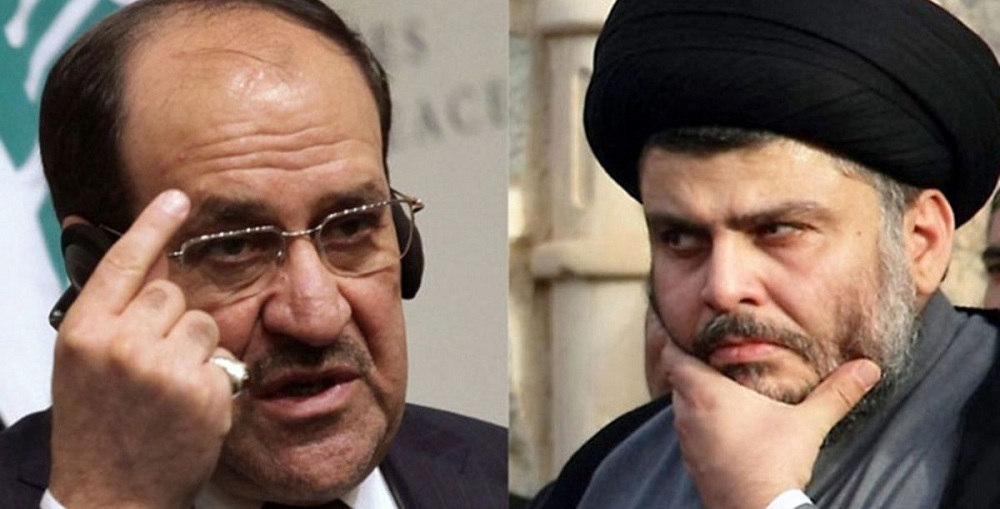Alwaght- Tense post-election days continue in Iraq. Muqtada al-Sadr as the winner of the October 2021 elections goes on with his tough and exclusionary approach towards the government formation. He has certainly been the top man of the Iraqi politics in recent months, attracting all of the attention to himself. He continues to insist on forming a majority government and shows no intention to walk back from his position.
In the latest comments, al-Sadr, who leads Sadrist Movement, reiterated his previous stances on the cabinet formation. In a televised speech, he openly opposed ex-PM Nour al-Maliki's participation in the new "national majority government." He held that he asked Hadi al-Amiri and Qais al-Khazali, leaders of two large blocs, to join the government but not al-Maliki, a proposal they turned down. The powerful cleric now seems more self-confident in confrontation of his rivals after federal court last week ruled the outcomes of the first session of the parliament were legal and thus not annullable.
To al-Sadr's frustration, however, the Shiite Coordination Framework (SCF), a bloc of Shiite parties excluding Sadrist Movement, insists on al-Maliki's role in forming the next government, and its leading political figures have stated that either al-Maliki will be part of the majority coalition or they will not join the government.
Ali al-Fatlawi, one of the leaders of the Fatah coalition, announced on Friday that the SCF has refused fo join a coalition government with al-Sadr and Sunnis without al-Maliki and informed al-Sadr of the decision. Now more than any other time in the past, Sadr-Maliki differences are on the Iraqi politics surface and this raises questions about the future possibilities and the reason behind al-Sadr's opposition to al-Maliki.
Continuation of differences or unwanted ceasefire
The tension between two leaders in the current situation makes unlikely any agreement and reconciliation between them, and the Sadrists, along with their Sunni and Kurdish allies, intend to form a national majority government, excluding the SCF. But looking at the history of politics and governance in different countries, there is a golden rule that suggests there is no permanent friendship and enmity in politics. Therefore, despite the current differences, it is also possible that a ceasefire takes place between al-Maliki and al-Sadr. A clear example of this is the alliance of the Justice and Development Party (AKP) with the National Freedom Party in Turkey, once political enemies, in 2018. Despite their conflict of views, the two Iraqi political leaders are not unlikely to reconcile.
Why does al-Sadr insist on majority government?
Several reasons seem to drive al-Sadr's push for al-Maliki-free government. First, the dispute with al-Maliki has a historical background and it seems that al-Sadr is far from forgetting the past. In 2008, when al-Maliki was PM, he militarily cracked down on al-Sadr-led Mahdi Army, a powerful militia, leading to its dissolution. Now, it seems that al-Sadr intends to settle a score with al-Maliki.
Muqtada al-Sadr has sought to be recognized as a national and religious leader in Iraq since 2003. Using his family background, he has widely promoted both nationalist and Shiite discourses. Many political observers now believe that he is trying to advertise and even foist himself on Iraqi society as a national hero and a charismatic leader. Actually, he does not intend to miss the opportunity to realize his long-held dream, the core of which is transformation into the politics top man. By running anti-Maliki agenda, al-Sadr tries, on the one hand, to save his leadership role and, on the other hand, foist himself on the other political forces.
Al-Sadr and government formation prospects
With these information in hand, where can the tensions of the two sides go? To answer this question, we need to know that after 2003, the majority-minority rule has never been underpinning the government structure and the major political decisions in the country. Based on an unwritten law, the political factions have always had a role in parliament decisions regardless of their quantitative weight.
Now, al-Sadr has not but two ways ahead. One is insistence on majority government and disregard of agreement principle and the other reconciliation with al-Maliki and formation of an agreement government. In case of first scenario, he has a very high cost to pay and bear pressures of various political groups. In addition to high costs for al-Sadr, this can fuel a big new political crisis in the country. If he chooses the more pragmatic scenario, besides preserving his leadership role, he can pave the way for an agreement-cabinet representing all political sides.



























